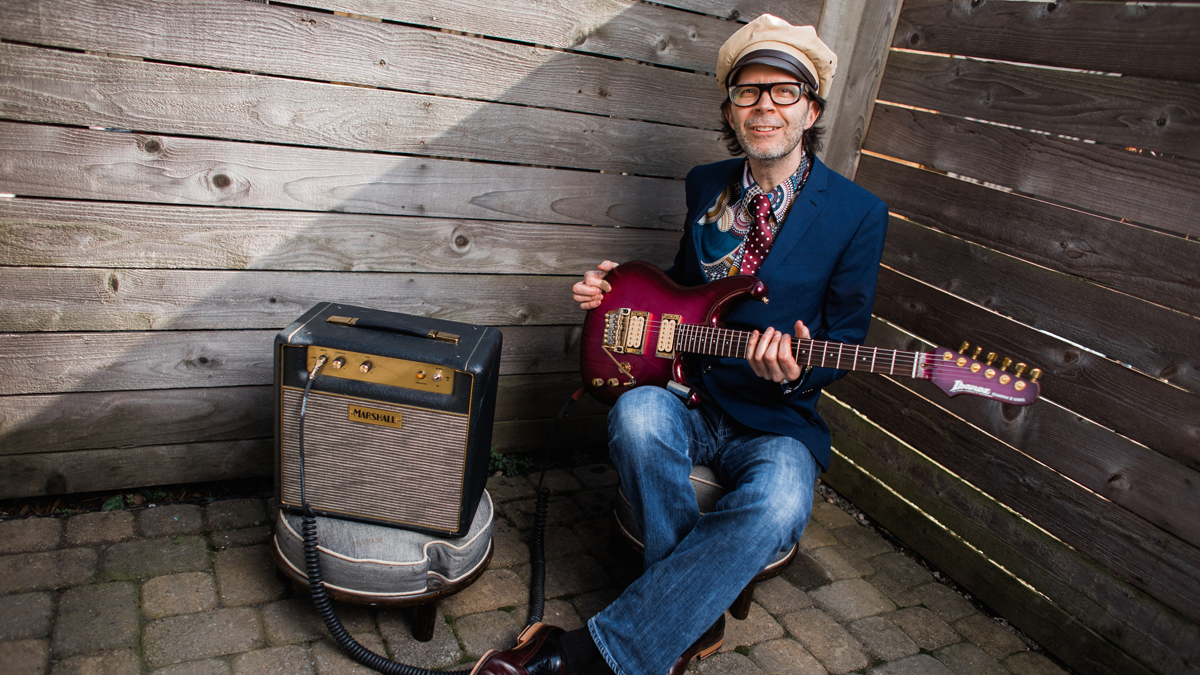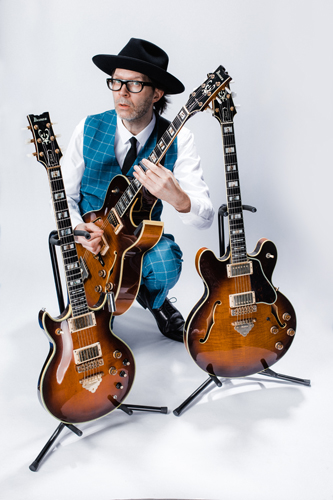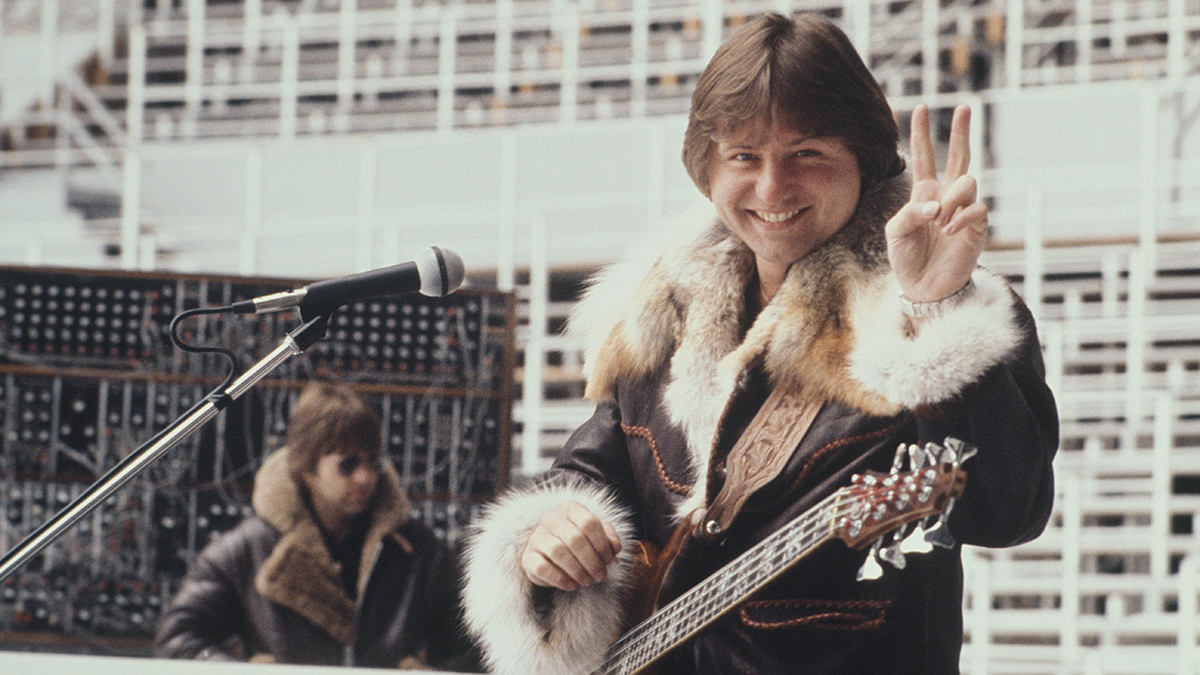Paul Gilbert: "My slide playing is a risky career move. There have been times when I've tried stuff on stage and people have walked out the door!"
The shred pioneer, melody enthusiast and rock guitar sensei extraordinaire on making his guitar howl for his new album, Werewolves of Portland

Sometimes we sell Paul Gilbert short. We laud him for his abilities on the electric guitar, and how could we not? He helped stake out the perimeters of what’s possible with the instrument and, in 2021, he remains out there, pushing the limits all the time.
But maybe we don’t talk enough about how entertaining his compositions are, about how he takes the art-form of instrumental rock and gives it a similar sort of box office appeal to what, say, The Ventures were doing back in the day. In other words, like the best of instrumentalists, his songwriting lacks nothing from the absence of the human voice. It’s a meal in itself.
Werewolves of Portland, his latest album, is classically Gilbert. Recorded at Portland’s Opal Studio with co-producer and engineer Kevin Hahn, its vibe is pure American rock. At times it broadcasts in the same care-free register and endless-summer feel of Richard Linklater’s Dazed and Confused, taking the guitar through the pop-cultural wormhole and inflecting instrumental rock with a sense of humor. At others, he’s straining at the leash of virtuosity to perfect yet another six-string set piece that blows our minds.
In slide guitar, however, Gilbert has found his voice. He jokes that he has only just discovered melody after four decades of playing the instrument. Maybe he is onto something. Sometimes our greatest creative epiphanies are right there in front of us all along. All Gilbert had to do was reach out with his guitar slide.
As he explains here, that did not come easy, but for a player who often writes lyrics for his instrumentals before putting music to them, developing a vocalistic slide technique is a second-act super power for his career, and he’s not afraid to use it. But, he says with a chuckle, after playing a ridiculous lick over the Zoom connection, you’ve still got to give the audience a little shred, too.
We often talk to you about the guitar first, but when listening to Werewolves of Portland, it’s instrumental guitar as entertainment, to the point where your guitar is doing the job of the singer.
“It was never really my job to do the melody. I always thought, 'That’s why you get the singer.' Also, I didn’t think the guitar should do melody. Because growing up – and I don’t know if this is popular culture – there was this thing called muzak. The actual company, Muzak, would take the popular hits of the day and make instrumental versions of them, and kind of suck the energy and life out of them – the idea was to have this background music for your office or whatever.
All the latest guitar news, interviews, lessons, reviews, deals and more, direct to your inbox!
“You got a sense that whoever was doing the melody was just reading a chart and had never heard the song. There were no elements of expression that a singer might have.”
Therein lies the conundrum for guitar players. We often need a great singer to make the song work.
“If you take a song like Help! by the Beatles, that’s all one note. And then finally you get some other note, and it’s real easy to take a melody like that and make it horrible, because if you don’t do anything to it, it just dies. First of all, the singer has the advantage of having words, so they can shape it, but you can shape it with your pick. You can get different pick sounds. You can slide into it. Add a little vibrato. And also, short and long [notes], that’s a big deal.
I grew up wanting to be a singer. The guitar? I just did it because I could. I loved guitar players, too, but my primary thing as a little kid was I wanted to be a singer
“I’ve learned a lot about these different elements of expression. One from listening to singers, and two from watching [laughs] – with apologies to my students – my students get it wrong! I wouldn’t say getting it wrong, but watching other people, and myself.
“Like, I did this melody on a Todd Rundgren song a few albums back, and I listen to it now and I just go, ‘Oh my Gargh! What was I thinking!?’ I’m missing half the elements of expression. They’re getting by me and I wasn’t able to pick up on them that well… Yet.”
But once you developed your slide game, that could assume the role of the vocals.
“I remember getting better and better at it, which is kind of a wonderful thing, because I grew up wanting to be a singer. The guitar? I just did it because I could. I loved guitar players, too, but my primary thing as a little kid was I wanted to be a singer. Just my voice was no good."

The guitar is a little easier to get better on, too. The physical limitations are less forbidding...
“The more I practice, the better I get, and that is not the case with my real voice. If I practice with my voice, like, I’ll strain the muscle and get tired. For the guitar, I could practice that all day and it will just keep sounding better. And it’s fun to get deep into a melody.”
What you said about playing one note and adding little accents and inflections on it makes a lot of sense. In the past, maybe people thought of you as Mr. Speed, but now it’s Mr. Texture, with nuance on those pseudo-vocal dynamics. Is that fair?
“At first, [my slide melodies] are not going to be good. I spent my whole teenage years tearing up the fretboard, and this melody thing is a recent thing. I’m going to have some stumbles. I’m not always going to do it right. And it’s a risky career move, in a way. There have been times when I have tried stuff on stage and I have seen people just turn and walk out the door! [Laughs] Not often, but that’s the scariest thing in the world.
“I was doing a Police song, Synchronicity I, which is this high-energy thing. I had worked up this Miles Davis So What version of that, and I just saw the exit door open. ‘Forget it. New song!’ Then I went back to my usual schtick and saved the show.”
But this is where you are at, and the risk is worth it. There is definitely a pronounced vocal quality in your phrasing.
“So far, so good. I feel comfortable enough, and a lot of the practice I did was when I would have one song in the set where I would do some slide or something, and then gradually mix it in there with the other stuff that people want, so that I have got enough authority with it and can actually include it in the package.”
I know you write lyrics and then write the guitar parts for the vocals, but do you ever have an actual vocalist in mind when you do this? I can imagine Problem Solving People written for Rocka Rolla-era Judas Priest.
“[Laughs] In the Mr. Big days, I always wanted to do that with Eric [Martin]. I always wanted to present a song that he would be comfortable with straight away, which usually wasn’t the case. Back then, if I was writing vocals, I would write them with me singing, and I have a different kind of voice – it’s lower, I tend to sing a more slurry, John Lennon-kind of thing. Eric would struggle with it because he is more of a soul singer.
“Really, the best answer is that I haven’t learned any slide guitar licks. All my studying has been singers. My first big challenge was Mercedes Benz by Janis Joplin and that was really hard! It was so different to the way I normally played. I just gradually got it together.
“Then I would learn Joy to the World or Some Kind of Wonderful. Like when guitar players learn a pentatonic scale, it’s new, but then after you learn 17 Aerosmith solos you start to go, ‘It’s that lick again!’ It’s the same thing with a lot of the singers I’m learning from. The first one is a big learning curve because it's all new stuff.
“Even with the metal stuff. I mean, the metal stuff that I like is usually from 1985, so the singers were still people who had grown up with soul music, or heard some blues, so even with Dio you’ll hear some soul licks – you won’t think of them that way because it’s in a minor key but… Long Live Rock ’n' Roll! There’s a lot of sliding around with it and the way that it falls on the guitar is a little tricky. That did not come easily. This is all stuff I worked on a lot.”
Has this enhanced your appreciation of overdrive? Because it can be so effective with the slide. Especially when you mention Janis Joplin, there was a little bit of the Tube Screamer to her voice.
“I hadn’t thought of that. When I think of overdrive, I think of sustain.. Slide is great for that, too, because you play with a slide and all of a sudden your sustain is tripled. I think the one discovery for me that was new was the pick.
The really nice thing about the pick is that it’s a tone control. You can get so many different tones with it
“A lot of people think about picking like, ‘Well, okay, that’s my tool for playing fast. I’ll get this moving and I’ll get something fast going.’ And you can. But the really nice thing about the pick is that it’s a tone control. You can get so many different tones with the pick and by also muting with the side of the hand.
“A lot of stuff I didn’t really think about until I had to teach it – to be able to completely mute with the right hand, where you keep the notes and it’s just not ringing. Because, overall, I am playing single-note melodies, and if I do that without muting then [it’ll ring out]. So to stop that, I hold the pick in an unusual way – I use two fingers. Not all the time but for slide especially, and that way I can mute with the side of the thumb. I can mute with my nail and get that without any left-hand muting at all.”
That’s funny, because muting is such a big part of the equation when dealing with the electric guitar.
“That’s like the main stuff I end up teaching because I am always surprised by how many students come to the instrument with classical instincts. I don’t think that they’ve been taught that way, just somehow that’s what their instincts tell them to do. And they very carefully get their finger in there, only touching one string, and that’s just a catastrophe with a loud electric guitar if you can’t mute anything.”
Absolutely. It wants to shout all the time and you need a strategy to hush it up.
“That’s, like, everything! [Laughs] You play one note, then you’ve got to control the other five strings. It’s this constant battle to shut the thing up. [Laughs] And then, both hands are involved in that. Some people put a hair-tie [at the nut] but you gotta teach your hands to do that.”
Talk to us about overdrive, because you’ve been doing a lot of overdrive business with JHS Pedals and TC Electronic signature pedals. How has your relationship with drive changed?
“With the particular way I hear things, it’s almost like there are two categories of overdrive styles. I wouldn’t say pedals because I have heard amps do this, too. There is like this warm, resonant overdrive, and the attack feels natural, and there is this other kind that is really harsh.
“I was doing a Mr. Big tour a couple of years ago and we had a support band in Texas, and the guy in the support band was soundchecking and I heard his guitar sound and was like, ‘Man! You sound great! What are you using?’ He said, ‘Oh I am using the Eddie Van Halen [5150] overdrive pedal.’ The MXR one. I got one, played two notes, and thought, ‘I am never going to be able to use this.’ It just has this harsh, weird little attack that feels unnatural to me. But when someone else played one, it sounded amazing.
If you have a vintage-style Marshall [overdrive], that’s perfect for me. It almost feels like I’m playing an acoustic instrument
“If you have a vintage-style Marshall [overdrive], that’s perfect for me. It almost feels like I’m playing an acoustic instrument.
“I don’t know. Maybe if my hearing was good I would love it, so I hesitate to be too critical because I know my hearing is weird. But that’s what I hear."
Definitely. Sometimes the overdrive feels like the wind at your back, making the notes sing. Other times it’s causing havoc.
“I just want it to be responsive to my playing, and if it does something extra that I didn’t do that’s kind of unsettling, and that’s what it feels like. Almost like there is this weird noise gate or something. If it is like that – I don’t spend much time with it so I don’t really have any expertise in it – I’ll plug it in and think, ‘Oh, it’s got that thing.’ And it goes in the closet.”
You played all the instruments on this record?
“Oh yeah. It was the quarantine so I was trying to figure out a way to do the album. I mean, I took a risk and breathed the same air as the engineer [Kevin Hahn], although we kind of sat far from each other. But playing drums is so much fun.
"I love drumming and it was just nice to move the body about a little bit because in quarantine, everyone, including me, is inside not getting much exercise. I suppose you could exercise inside but it’s not as much fun. It was really fun to play drums and have a reason to move the arms and legs around.”

There is so much energy in the record. Do you have to have a clear idea of where the material is going so you can sort of build up to the recording?
To know that you are doing something and someone on the planet is responding to it is really useful
“I had the human communication and response of the engineer, and that was really important, just to have somebody who smiles when it’s good and frowns when it’s bad, and to know that you are doing something and someone on the planet is responding to it. I found that really useful.
“I think when I was in my early twenties I just had so much energy that I was able to do a lot of stuff completely on my own, but as time goes on it is hard to keep up the energy. It’s nice to have that little affirmation, like, ‘Is this any good?’ Then you get a grin. ‘Okay! Keep going!’”
That’s one of the strange things about YouTube guitar culture. You don’t have the affirmation; it’s quite the opposite.
“You get likes later! But if that’s all you have it’s better than nothing. My online school is a little like that. My online school is not live, but the thing with that is that it’s not performing. I perform in every video that I do, but I am performing with the idea of helping someone out with something specific. I’ve got a very specific message to get across, and I can actually get it across clearer without them there.”
You’ve got some time to think about the lesson?
“I’ve got the advantage of having a person whom I’ve watched play, I’ve listened to them, I know what they need, and I always wrap the solution up in music. I go, ‘Okay, you need to be able to have a flexible wrist.’ I’ll come up with a riff that you need to have a flexible wrist in order to play it, and then I’ll play it and explain it. I can be really focused about my answer.
“Of course, I have done impersonal lessons but those tend to be draining! It is almost like you’re performing all the time, doing a show, and a lot of times there are a lot of questions. Like, deep inside, ‘Is this going to help the person or is it too much?’ If someone says, ‘I want to learn Japanese,’ you can’t go, ‘Okay, well here’s a dictionary. Let’s read it and memorize the whole thing.’ It’s too much!
“With these videos, you can take a small digestible amount, get all the details, and the results are great. My students are really getting better and it helps me think through things. Their questions are better and my answers are better, and that’s the one situation where it is better than live.”
You talked about your hearing loss earlier. Did that affect how you recorded this album?
“I try not to listen to click tracks ever, because back in the Mr. Big days, I’d have headphones on and it’d be like TICK-TOCK-TICK-TOCK… All day. Of course, the way I did this album, I had to do that, at least for the drums, so there was really no way around it. I just tried to get headphones that block some sound and as soon as I got the drums down I would take the click out. But I must admit, that’s one thing that’s nice about playing with a live band.”

What about the guitars on this record? You’ve gone back and raided the Ibanez archive for lesser-spotted guitars like the Artist, Roadstar II and Ghostrider.
“Well, first of all, it’s inexpensive. At least, the ones I found were. The thing I liked was some of the whammy-bar stuff on the ones that don’t lock, like the Roadstar guitars, I just got one and this is 500 bucks! Made in Japan, 1983.
“I bought locking tuners that I’m going to put on later, but you know what? Even without the locking tuners it stays in tune really good! And it’s got that Van Halen thing. Because, Van Halen, he did those first couple of records without a locking system – definitely the first album. He didn’t have the Floyd Rose yet. And those non-locking ones have got a certain feel and resonance.”
- Werewolves of Portland is out now via The Players Club.
Jonathan Horsley has been writing about guitars since 2005, playing them since 1990, and regularly contributes to publications including Guitar World, MusicRadar and Total Guitar. He uses Jazz III nylon picks, 10s during the week, 9s at the weekend, and shamefully still struggles with rhythm figure one of Van Halen’s Panama.

